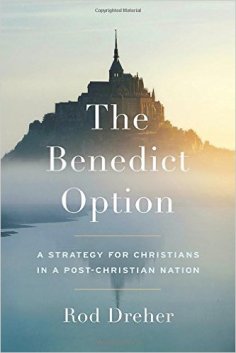(455) THE BENEDICT OPTION – Emerging Trends in the Church Today
THE BENEDICT OPTION

A new book by Rod Dreher, The Benedict Option, is getting a great deal of exposure and write-ups across many branches of Christianity. It is promoting a strategy for Christians to engage in our post-Christian nation that we find ourselves today.
I will most likely be writing more about the book in the near future, but for now, I will give a few comments based on reading some reviews and listening to a podcast with Rod Dreher describing his book and why he wrote it.
I heard a podcast interview at the Impact 360 Institute –
Should Christians Take The Benedict Option? An Interview with Rod Dreher
My brief review from listening to Dreher’s comments in the interview include the following comments:
Rod Dreher does make some very good points. He identifies some of the problems that Christians in our society face today. His point is well taken – college kids and young adults just don’t know about the basics of the faith and have grown up in the church but still lack discipleship in their walk.
However, where I would disagree with Dreher is in what he recommends as a solution.
Since the popularity of groups such as the Emerging Church…etc., there has been a trend to look negatively at the church today and instead look back to the so-called “early church” to see supposed “true Christianity” as a guide to how we should live out our faith today. The problem with this approach is, although it is not their intention, they move further from God’s word and look instead to tradition. Worse, much of their tradition is along the lines of ancient Roman Catholic & Eastern Orthodox mysticism. It is a mystical approach to faith that aligns itself very closely with Eastern Mysticism and includes practices that mirror practices from Buddhism, Hinduism….etc. There are many examples of Catholic and Orthodox priests and scholars having Buddhist monks teach in their seminaries on how to meditate and pray according to these traditions that align very closely with Buddhism….etc.
They don’t abandon the faith and to their credit, they include prayer and Bible study as a part of their focus. But they introduce practices that have no basis in the Bible and mix in with Christian practices. The most dangerous perspective of this approach is how it is introduced to Christians – it’s done in a very subtle manner. The results of which show that it can be difficult to identify what these practices actually are to Christians. They then use Christian sounding terms to describe these practices and Christians today have become desensitized to their actual meaning.
For example, terminology that includes words and phrases such as “formation”. “rhythms”, “silence”, “stillness”, “solitude”, “contemplative”...etc. are included with concepts such as meditation and prayer. The problem is that these phrases describe Eastern Mystical practices, not biblical practices outlined in Scripture. Biblical meditation is different than mediation being promoted by those promoting a contemplative faith. Eastern Orthodoxy is filled with these types of mystical practices. The take even reading the Bible and use a practice called Lectio Divina which doesn’t encourage the participant to understand what Scripture is saying but instead through repetition of words, phrases, periods of silence….etc., they are to experience a closeness to God. What? Is that what the Bible calls us to do?
In addition, patterning our walk today after a monastic lifestyle makes no sense. Granted, Dreher states that his intention is not to recommend living like monks lived in the 6th century. But, much of what is presented is copying the lifestyle and theology of these monks who have left civilization to live as hermits – I don’t think that is what Jesus had in mind when giving us our marching order with the Great Commission. That is biblical discipleship.
The Evangelical Church today has been inundated with these practices. We would be wise to cut out the middleman and go directly to God’s word for our edification and spiritual growth. True discipleship has to focus on God’s word, not these alternative practices that have more similarity to Eastern Mysticism than they do the Bible.

Recent Comments